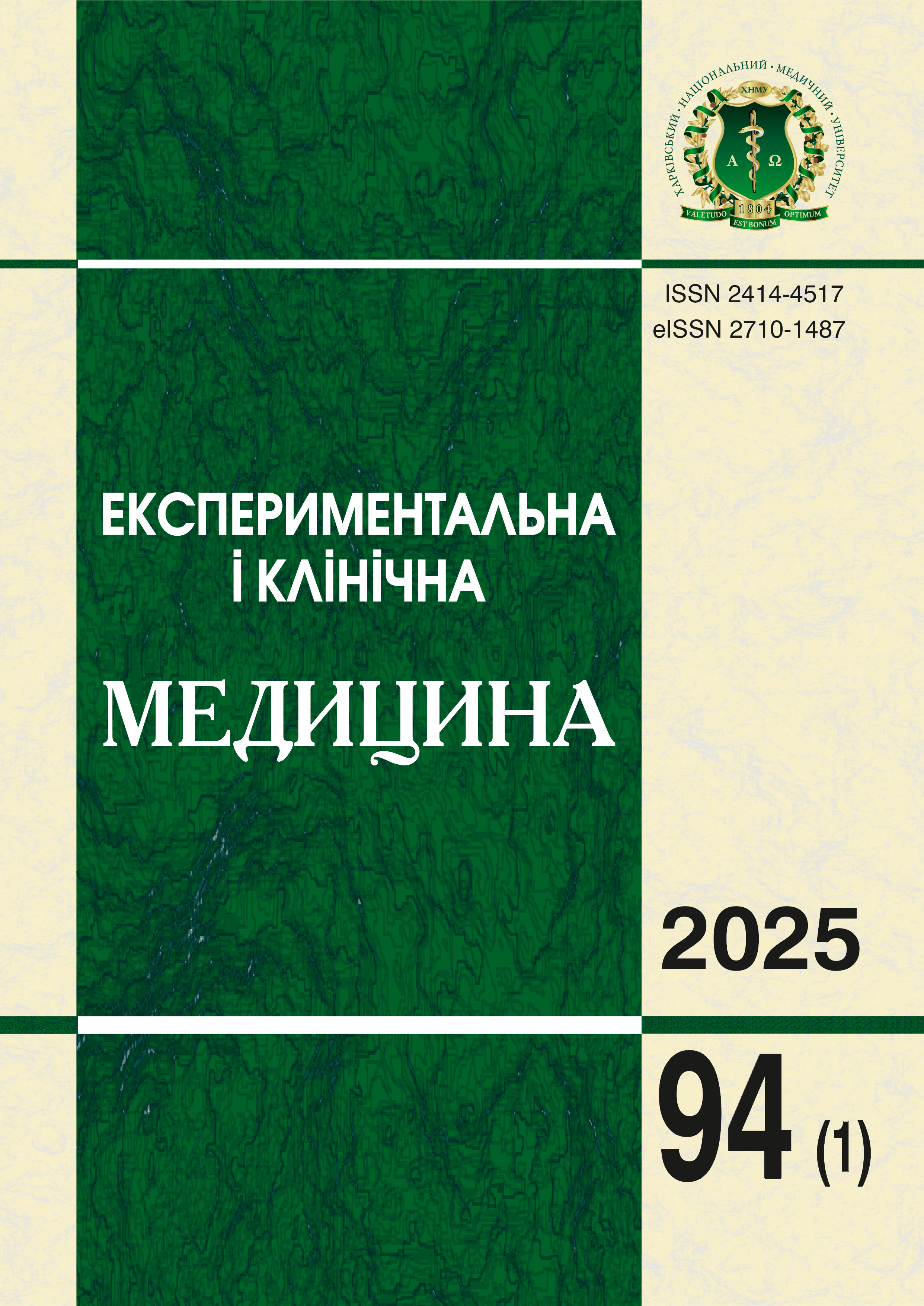Abstract
Under wartime conditions, the prevalence of affective disorders among the general population of Ukraine has increased to 46%. Recent studies demonstrate significant gender differences in the manifestations, course, and response to therapy of these disorders, highlighting the need for the development of gender-sensitive therapeutic approaches. The study aimed to develop and test a gender-personalized therapy for affective disorders in individuals affected by hostilities. A comprehensive clinical-psychopathological and psychodiagnostic assessment was conducted on 148 patients with affective disorders, divided into two groups: Group I – 83 residents of frontline territories, and Group II – 65 internally displaced persons. To evaluate the effectiveness of the developed gender-oriented psychotherapeutic correction system, the participants were further divided into a main group (81 patients) and a control group (67 patients). Standardized psychodiagnostic scales were used in the study. A gender-personalized treatment system for affective disorders was developed, combining tailored psychopharmacotherapy and psychotherapy. For men, therapy focused on cognitive-behavioral, existential, and mindfulness-based approaches, with behavioral activation or art therapy added depending on group. For women, crisis therapy, mindfulness-based cognitive therapy, and body-oriented psychotherapy were central, supplemented by art or acceptance and commitment therapy based on group assignment. The program varied by diagnosis and group, emphasizing gender-specific needs and therapy responsiveness. Efficacy evaluation confirmed the advantages of the developed gender-personalized therapy system for affective disorders. Implementation of the developed program resulted in significant reduction of severe anxiety episodes (to 11.4% in men and 10.8% in women in the main group versus 33.3% and 35.7% in the control group) and depression (to 9.1% and 8.1% respectively versus 30.7% and 32.1% in the control group). The average quality of life score was 30.4–30.6 in the main groups compared to 12.1–11.7 in the control groups.
Keywords: depressive disorders, psychotherapy, wartime conditions.
References
Seleznova V, Pinchuk I, Feldman I, Virchenko V, Wang B, Skokauskas N. The battle for mental well-being in Ukraine: mental health crisis and economic aspects of mental health services in wartime. Int J Ment Health Syst. 2023;17(1):28. DOI: 10.1186/s13033-023-00598-3. PMID: 37749608.
Chaban OS, Khaustova OO. Medico-psychological consequences of war distress in Ukraine: what we expect and what should be considered when providing medical care? Ukrainian Medical Journal. 2022;4(50):11p. DOI: 10.32471/umj.1680-3051.150.232297. [In Ukrainian].
Lushchak O, Velykodna M, Bolman S, Strilbytska O, Berezovskyi V, Storey KB. Prevalence of stress, anxiety, and symptoms of post-traumatic stress disorder among Ukrainians after the first year of Russian invasion: a nationwide cross-sectional study. Lancet Reg Health Eur. 2023;36:100773. DOI: 10.1016/j.lanepe.2023.100773. PMID: 38019977.
Chudzicka-Czupala A, Hapon N, Chiang SK, Zelazny A, Grabowski D, Kang YR, et al. Depression, anxiety and post-traumatic stress during the 2022 russo-Ukrainian war, a comparison between populations in Poland, Ukraine, and Taiwan. Sci Rep. 2023;13:3602. DOI: 10.1038/s41598-023-28729-3.
Zelenska KO. Gender analysis of the specificity of neurotic disorders in different categories of persons affected by hostilities. Experimental and Clinical Medicine. 2021;2(90):52-7. DOI: 10.35339/ekm.2021.90.2.zel. [In Ukrainian].
Martsenkovskyi D, Shevlin M, Ben-Ezra M, Karatzias T, Hyland P. Mental health in Ukraine in 2023. Eur Psychiatry. 2024;67(1):e27. DOI: 10.1192/j.eurpsy.2024.12. PMID: 38533670.
Kozhyna H, Vyun V, Zelenska K, Samoilova O. Pathogenetically substantiated psychotherapeutic targets of adaptation disorders in young internally displaced persons. Medicine Today and Tomorrow. 2020;2(87):36-41. DOI: 10.35339/msz.2020.87.02.04. [In Ukrainian].
Koltsova HH. Personalized programs of psychotherapeutic support and prevention of suicidal behavior in patients with depressive disorders. Medical Psychology. 2020;1-2:104-8. Available at: http://www.mps.kh.ua/archive/2020/12/13 [In Ukrainian].
Weinberger AH, McKee SA, Mazure CM. Inclusion of women and gender-specific analyses in randomized clinical trials of treatments for depression. J Womens Health. 2010;19(9):1727-32. DOI: 10.1089/jwh.2009.1784. PMID: 20718626.
Carlbring P, Hagglund M, Luthstrom A, Dahlin M, Kadowaki A, Vernmark K, et al. Internet-based behavioral activation and acceptance-based treatment for depression: A randomized controlled trial. J Affect Disord. 2013;148(2-3):331-7. DOI: 10.1016/j.jad.2012.12.020. PMID: 23357657.
Zhang B, Wang Q, Wu S, Xu Y, Zhou Y, Chen L, et al. Effect of acceptance and commitment therapy for depressive disorders: a meta-analysis. Ann Gen Psychiatry. 2023;22(1):31. DOI: 10.1186/s12991-023-00462-1. PMID: 37553635.
Kozhyna HM, Khaustov MM, Koltsova HH. Gender approach to psychotherapeutic correction in complex treatment of depressive disorders. Medicine Today and Tomorrow. 2021;90(2):70-7. DOI: 10.35339/msz.2021.90.2.kkk. [In Ukrainian].
Spendelow JS. Cognitive-Behavioral Treatment of Depression in Men: Tailoring Treatment and Directions for Future Research. American Journal of Men’s Health. 2014;9(2):94-102. DOI: 10.1177/1557988314529790. PMID: 24722466.
Ogrodniczuk J, Staats H. Psychotherapie und Geschlechtszugehörigkeit: Brauchen Männer und Frauen unterschiedliche Behandlungen? [Psychotherapy and gender: do men and women require different treatments?] Z Psychosom Med Psychother. 2002;48(3):270-85. DOI: 10.13109/zptm.2002.48.3.270. PMID: 12136448. [In German].
Pieh C, Altmeppen J, Neumeier S, Loew T, Angerer M, Lahmann C. Geschlechtsunterschiede in der multimodalen Therapie depressiver Störungen mit komorbider Schmerzsymptomatik [Gender differences in response to CBT-orientated multimodal treatment in depressed patients with chronic pain]. Psychiatr Prax. 2012;39(6):280-5.DOI: 10.1055/s-0032-1305097. PMID: 22926792. [In German].
Grubbs KM, Cheney AM, Fortney JC, Edlund C, Han X, Dubbert P, et al. The role of gender in moderating treatment outcome in collaborative care for anxiety. Psychiatr Serv. 2015;66(3):265-71. DOI: 10.1176/appi.ps.201400049. PMID: 25727114.
Cuijpers P, Weitz E, Twisk J, Kuehner C, Cristea I, David D, et al. Gender as predictor and moderator of outcome in cognitive behavior therapy and pharmacotherapy for adult depression: an "individual patient data" meta-analysis. Depress Anxiety. 2014;31(11):941-51. DOI: 10.1002/da.22328. PMID: 25407584.

This work is licensed under a Creative Commons Attribution-NonCommercial-ShareAlike 4.0 International License.

